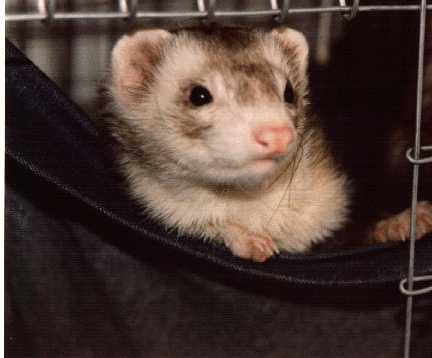


It's inevitable, if taken care of properly your ferret is going to get old; and with old age comes a long list of possible health issues that are inherent with old age for your fuzzy friend. In this section I hope to cover a number of things in hopes to help prepare you for whats to come.
How Old is Old?
A ferret is considered “late middle aged” at 4 to 5 years. A ferret is elderly at 6 years of age. An animal that reaches 8 - 9 years old is quite old. But what if you don’t know how old you ferret is? Even many vets are unsure how to age a ferret.
Experts determine a ferret’s age by looking carefully at their two long, upper canine teeth. (You’ll need to scruff them to get a good look.) A ferret under 1 year has bright, solid white canine teeth. At 1.5 to 2.5 years, you will start to see the tip of the tooth beginning to become a little yellowed, and almost translucent. At 3 - 4 that translucency will be more pronounced and continue farther up the tooth. By 6 years old the tooth may be distinctly yellowed all the way to the gum, and you may begin to see that some of the small teeth in their bottom jaw are missing. If you can, compare your ferret’s teeth to another ferret of whose age you are sure, and you will see the differences.
Preparation:
First thing you need to remember is that it is never too early to start preparing, think of it as saving for their retirement.
Younger ferrets are so full of energy and curiosity, and it can really be heartrenching to see them in the later years being inactive. Old age in a ferret may slow them down, but it is anything but a curse. An older ferret is quite content with laying down and relaxing in your lap, so you can enjoy a different type of quality time; where it use to be spending hours a day playing and laughing it is now time to sit and chill.
One of the most important things you can do is to pay particular attention to his/her nutritional intake. Arm yourself with as much information about healthy foods and vitamin supplements for ferrets as you can. There are suggestions widely available for simply supplementing a diet of kibble, or for creating your own nutritionally-balanced feeding regime (on the Internet, and in Kim Schilling’s book “Ferret’s for Dummies”). Depending on the health of your older ferret, you may need one or more of these recipes, commonly referred to as ’Duck Soup‘. Be sure to let your vet know what you are feeding and how much, as this may help them make a more informed diagnosis when there is a problem.
Adjusting:
You need to match your pet’s housing to their physical ability, living with an elderly ferret is an on-going learning experience.
They may no longer be able to climb cage ramps. They may not be able to climb into a favorite basket and may have a lot of trouble walking on slippery floors. You may need to arrange their cage so everything the oldie needs is on the ground floor, and make sure it is easy to enter. Look for very low baskets that are a little “scratchy” – an older animal may have trouble scratching an itch, and something they can rub against feels great. Infant play mats provide extra padding for them to sleep upon. Throw rugs will help them walk steadily, and don’t put too much distance between those important food, sleep, and litter spots.
While you’re at it, make sure those rugs are washable! An older animal’s weaker hindquarters may make it very difficult to stand upright when eliminating. They may very well begin to use those easy to stand on rugs. I use large pieces of rubber-backed bathroom carpeting. It can be cut smaller if needed, and cleans well in your washing machine. (To avoid ruining the rubber backing, let it air dry or use a cool dryer setting.)
Even if your oldie is determined to use the litter box, he or she may have trouble getting into it – or making it there in time. Make sure your litter box has a short side – cut it down, if you have to – and put more litter boxes wherever they live. I use flat newspapers for litter – if the animal is very old, placing paper toweling on top gives them more leverage. Be forgiving of your oldtimer; they can’t help their “mistakes,” and we can only hope if we become old and incontinent, someone will treat us with similar patience and kindness.
Older ferrets are far more sensitive to heat and cold. While they enjoy sleeping next to a radiator in the winter, care should be taken to keep them cool in the summer. They are more susceptible than young ferrets to heatstroke, and should not be kept in temperatures over 85 degrees. Keep in mind that natural light is wonderful for all ferrets, not just elderly ones. If they must be in artificial light in your home, purchase full spectrum light bulbs. “The ferrets go right to them,” she says, “as if they can feel the difference.”
Warmth, light, and cleanliness are just as important to an old ferret as it is to an older human. Please, don’t house an animal that may have arthritis in a damp basement or, worse, outdoors. Would you make Granny live in a tent or in the garage? If so, I hope she hits you with her cane! An elderly animal can’t tell you when they are uncomfortable – YOU must think about their comfort.
Final Thoughts:
The final and most significant thing you can do for your ferret is to never give up hope! Letting go when it’s time is an important and difficult decision for any family. Keep in mind though, that ferrets are resilient little creatures. We have all seen ferrets recover from battles that no one thought they could win. While all of the possible health issues that your older ferret might encounter are not covered here, hopefully this information prepares you for the basics of what you will face. Remember to use your health record as a guide, use all of the great knowledge you have learned while living with your ferret, get educated about ferret illnesses and what to expect when your ferret is ill, notice any changes in your ferret’s behavior and as always, work closely with your vet. Utilizing as many of these tools at a time as possible, may get your ferret on the road to recovery.
The best advice I can give anyone, new owners and experienced care givers alike, is to read some of the great information that is available in books and on the Internet and start planning for the future now.

http://www.rud.dk
